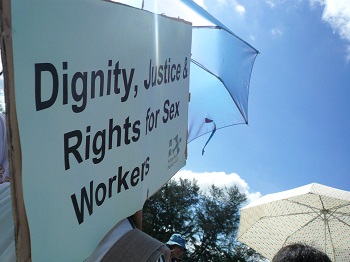Sex Work and Violence
(By BM)
When sex workers provide sexual services, they are often exposed to varying degrees of violence because of the highly private work environment. In fact, even if before entering the private space, some sex workers may also be subjected to different types of violence.

For example, a sex worker who works on the street may be considered "offensive" (as women do not like being mistaken as sex workers and men do not like being seen as clients) and treated with physical violence. As for sex workers working in one-sex worker-apartments, even that they only provide sexual services in their own units, there is still a chance that they are subjected to verbal or physical violence from neighbours. Once a sex worker was constantly harassed by a neighbour, who verbally abused her and intimidated her by kicking the door non-stop. It made her feel worried and fearful.
In addition to physical violence and verbal violence, online violence is also a problem facing sex workers. Most sex workers do not want to let people (especially families and friends) know that they are engaged in sexual services. However, it happened more than once that images and personal information of sex workers were disclosed on the Internet without their consent, and they were therefore severely troubled.
In a normal case, victims of violence can seek help from the police, social service agencies, or units that provide psychological counselling. However, due to the prejudice and misunderstanding of sex work, sex workers, even in need, may be afraid of being labelled and dare not take the initiative to ask for help.
In the face of violence against sex workers, in addition to strengthening public education on violence prevention and reviewing existing laws (such as allowing sex workers to operate together to take care of each other), training could also be provided to professionals such as medical care providers, social workers, psychologists and counsellors, etc. in order to reduce their discrimination against sex workers, encourage people in need to seek help as soon as possible, and prevent sex workers from suffering long-term violence before more serious emotional health and public security problems occur.





 Mailing Address: P.O.Box 98108, Tsim Sha Tsui Post Office, Kowloon
Mailing Address: P.O.Box 98108, Tsim Sha Tsui Post Office, Kowloon
 (852)27701201
(852)27701201 


